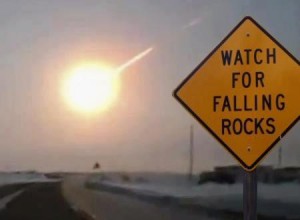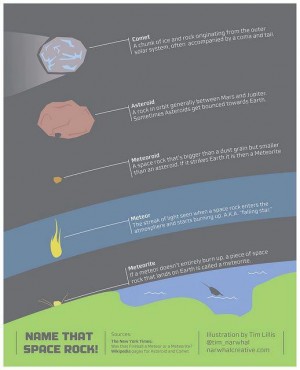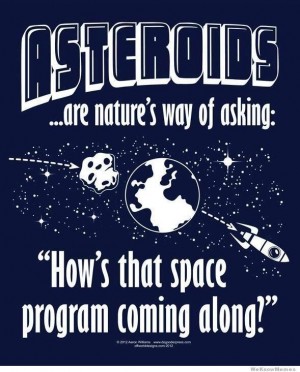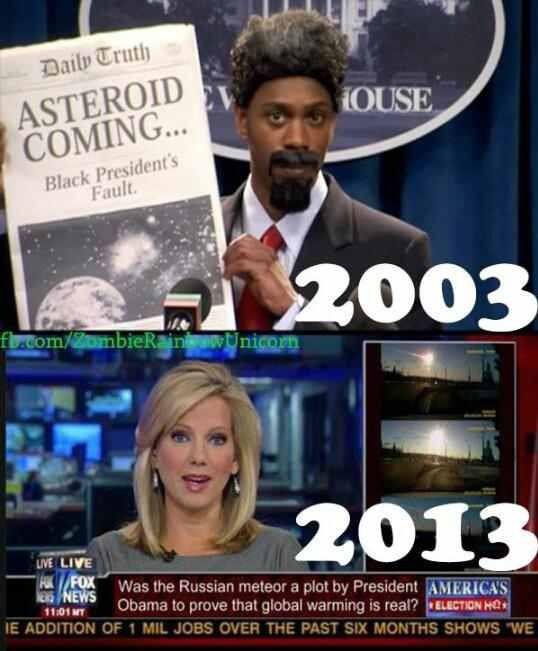rocks from space—and rocks in the head

Last Friday we all got a message from space. For weeks, scientists had been talking about the close pass of Asteroid 2012 DA14, and trying to use it as an opportunity to educate the public about the risk they might pose. Then, without any warning, a much smaller piece of rock zipped through the sky above Siberia and left lots of damaged windows and buildings—and a LOT of amazing footage from cameras of every kind (including lots of dash cams, which are the rage in Russia because of all the horrendously scary driving and insurance issues). Immediately, the media and internet was flooded with stories of every kind, from the merely uneducated (typically from mainstream media newspeople who know no science) to the positively weird. Count on an event like this, which grabbed the media’s fleeting attention worldwide for a precious day, to be the source of every bizarre notion you can imagine (and some you can’t).
First, some basics. It was apparent as news people all over the media mangled the terminology that most people don’t know one space object from another. Yet all of these objects in space have distinct names, and it’s not OK to interchange one with another. Thanks to the many crappy sci-fi movies about impacts threatening civilization and requiring Bruce Willis to save President Morgan Freeman and the rest of the world (never mind that none of them are remotely plausible scientifically), some of this misunderstanding is excusable. These mistakes are just symptomatic of the general scientific illiteracy of most people—sadly, even among news media people who should understand more of the facts behind the news they read than they actually do. (Cue the references to the hyper-smart newsman played by Jeff Daniels in the HBO series “The Newsroom”, who actually knows the facts behind most stories, and can conduct in-depth interviews without cue cards or teleprompters). Just so we’re all clear on these things, a helpful graphic is provided below the fold.
In a nutshell, there are two kinds of objects floating out there among the planets: asteroids, which are rocky objects mostly moving around Sun in the orbit between Mars and Jupiter (the “asteroid belt”, a remnant of a larger planet that has long since shattered); and comets, which are masses of dirty ice that have much larger orbits that typically go well outside the solar system, then loop by the Sun and some other planets every few decades or century or so. A few asteroids are outside the asteroid belt, and even fewer are in orbits that might cross earth’s orbit. If larger objects (larger than a dust grain but smaller than an asteroid) enter earth’s gravitational pull, they become meteoroids. As they burn up entering the earth’s atmosphere, they become meteors (or “shooting stars”). The vast majority of these burn up completely and leave nothing on the ground, but if they are large enough, some of the space rock reaches the earth’s surface and impacts. Those rocks we can collect are meteorites.

Most of the media coverage I saw was OK. The newsreaders stuck to their scripts, and tried to have someone with scientific training aboard to lend “expert” commentary (Neil DeGrasse Tyson and Bill Nye were working overtime that day, I’m sure). Still, there were lots of myths and misconceptions that were being propagated. The most common was the coincidence of these two events happening at the same time. Most people make the false correlation of two events happening together as having some connection and commit the “post hoc” fallacy. Whenever it was explained to these people that it WAS a coincidence, they could not accept this. But as Phil Plait points out, the objects were in totally different orbits going in opposite directions. There is no possible connection between the two, and this is one more instance of the fact that accidental coincidence happens all the time, and we must resist the natural tendency to associate events that are unrelated. (More about this below).
The second common misconception was this event was unprecedented, or that we were suddenly getting bombarded. Certainly the public attention it got was unprecedented (because of the explosion of worldwide media outlets and the internet, and the record number of cameras that filmed it), but small meteors hit us every few hours, and events like this happen every decade or so. Remember, 70% of the earth’s surface is covered by oceans, and so most of these events are small meteors landing in the open ocean that are rarely seen by humans and too small to pick up on radar before they burn up. But as numerous scientists pointed out, we’ve had big events like this in just the last century. North America has been struck in the recent geologic past, since the Willamette meteorite found near Eugene, Oregon, is the sixth largest meteorite ever recovered. In 1908, some large object exploded over Tunguska, Siberia, which has been a favorite event of the UFO nuts and woo merchants ever since then. Most likely, the Tunguska object was another meteor only slightly larger than the one that burned up last Friday, but with enough energy to flatten 80 million trees over 830 square miles and torch the ground. (No debris has ever been found, so it apparently burned up completely). By contrast, there are reports that some have found meteorite fragments from Friday’s event, and there’s a “gold rush” going on there now, because such meteorite fragments are worth more than their weight in gold.
And no, Russia is not a “meteorite magnet”. It just happens to be the largest country on earth, with a huge land area that makes it the next most likely target after the oceans. In fact, the best places to find meteorites are very predictable: they need to be large open barren land areas with limited vegetation and even slower rates of weathering and erosion, so that meteorites are visible and can be recovered soon enough before they weather away. Not surprisingly, the best hunting is in Antarctica (where the flowing ice conveyer-belts it to the surface and meteorites accumulate) and in Australia.
A third common myth was that it left a “burning crater” that appeared as splashy video footage all over the internet within hours. No, that footage is from the Derweze, Turkmenistan, gas explosion, a drilling operation that in 1971 hit a huge pocket of natural gas that then collapsed and swallowed up the drill rig. The oil geologists decided to ignite it and “flare it off” as they do with much natural gas they cannot recover. It is still burning almost 42 years later, with no signs of stopping, and has been nicknamed “The Pit of Hell” or the “The Door to Hell.” If there is an impact crater, it is probably this circular hole through the ice on a lake, but judging from its size, the piece of rock that survived wasn’t very big. Divers have gone down in the freezing water to find any meteorites but so far no luck.

Then there was a lot of media speculation on why we didn’t see this object coming, and whether it poses a threat to us. As this article points out, the object is too small to be seen by most of our current detection techniques, and even looking at old telescope images after the fact, we could only pick it up at best a day or two before impact. As this article summarizes, however, we are getting much better at tracking these objects. All the largest objects have been detected for a long time and none pose a serious threat to the earth. More recent efforts and technology have now picked up 100x more objects of smaller and smaller size, so it’s just a matter of time and technology and money if we want to catalogue and evaluate most of the large objects that could harm us. Apparently, the warning from last Friday was scary enough that even tax-cutting, science-denying Congressmen like Dana Rohrabacher (R-CA) wants the U.S. to spend money to improve our detection of these objects. Nothing gets the attention of the people and their politicians than a close call, I guess!
But given the media attention the event generated, it was guaranteed that there would be downright kooky and crazy ideas out there, too. Typical of this was the empty-headed CNN announcer who asked Bill Nye if this event was somehow related to global warming! Apparently, some people think all events happening outside the earth, whether from our atmosphere, or from space, are somehow the same.
As the Skeptophilia blog pointed out:
But no. It couldn’t be just a coincidence. Start with a post in the blog Twilight Language, wherein we find the following quote from “astrologer Philip Levine:”
In other times and places, these would be a sign, a very big sign, saying something (what depends on which prophet or psychic you listen to). If you think the Universe is intelligent and an embodiment of some kind of Being, then you would want to know what It is saying.
If, like most, you believe the Universe is just a random collection of debris with no meaning other than chaos, then Statistics is your God. And the statistical chance of ONE of these things happening is immensely small, but TWO on the SAME DAY, within hours, in this infinitely vast Universe, is something to give one pause.
If you aren’t sticking your head in the sand, how does this coincidence/synchronicity strike you?It strikes me as a damn coincidence. That’s what you call it when two events coincide.
Then we had Russian parliament member Vladimir Zhirinovsky blathering on that the meteor wasn’t actually a meteor, it was an American weapons test:
Those were not meteorites, it was Americans testing their new weapons… (Secretary of State John Kerry) was looking for (Russian Foreign Minister) Lavrov, and Lavrov was on a trip. He meant to warn Lavrov about a provocation against Russia.
Right. Because that’s plausible. The US Secretary of State calls up, and says, “Um… just so you know, we’re about to blow up a weapon over one of your cities today. Hope you don’t mind. Give my regards to the wife and kids.”
Things only got worse from there. A “senior clergyman” in Yekaterinburg said the meteor was a Sign from God:
From the Scriptures, we know that the Lord often sends people signs and warnings via natural forces. I think that not only for the Ural [regions] residents, but for the whole of humanity, the meteorite is a reminder that we live in fragile and unpredictable world. It is the Lord’s message to humanity, and we need to pray to understand it.
Or, maybe, just consult an astronomer. They seem to understand it pretty well.
Which is more than I can say for major league baseball player José Canseco, who weighed in on the event with the following series of tweets:
No way was that a meteor in russia today
Governments think truth is a poison that will kill them
we have lots of enemies dont underestimate them
long range test deal with russia operation meteor
north korea do the mathThe media is now calling Canseco a “meteor truther.” Which makes me want to weep softly and bang my head against my desk.
And then there is this clever Poe, where the Fox news crawl has been Photoshopped, but not too farfetched compared to other stuff on that same network:


The message that “we live in a fragile and unpredictable world” is actually very true, and something that both atheists theists are liable to forget, because it’s frightening.
If someone wants to use poetic license to phrase that as “God is telling us we live in a fragile and unpredictable world”, and take that poetic license literally, thus turning it into a religious statement, no harm done.
Where it gets scary is if people form theories that might lead to destructive actions, like “the Americans did this” or “God hates gays and sent the meteor to kill gay people”. I hope no such people collectively get their finger on the nuclear trigger.
I totally disagree that there is no harm done if these people take potential and real disasters as a warning from God,because a ‘rational’ response on their part would be for everyone to gather in churches and drop to their knees and pray for God’s help/forgiveness/mercy (whatever),instead of acting,say to accelerate our space program for defensive purposes,or to curb CO2 to prevent a total collapse of our environment.The former requires faith in God,and nothing else,the latter requires science,technology,brains,man power resources,and the will and determination to act…then,and only then, if they want to throw in a bit of praying it might do no harm.
hm, that is an interesting idea. I wonder though, how often religious people actually react in the way you suggest. Religious people have historically been quite willing to go to war, they’ve engineered defenses for their cities rather than relying on God to keep enemies away; they have grown crops for food rather than praying for manna. Mostly they ACT as if their welfare were their own responsibility and there weren’t any God. You’re taking religion more literally than many religious people do.
And many religious people would vehemently disagree with the idea that faith in God implies it’s OK to relax & do nothing about problems; instead they see themselves as God’s agent, doing God’s work.
“God is showing us our world is fragile and uncertain” sounds like a wakeup call to me.
But, it also might function as a way to wrap the threatening reality of danger from space-rocks, in a comforting blanket of “God” – i.e. a religious person might hope that God will prevent them from getting smashed by a space rock, or even if they do get smashed by a space rock, it’s basically OK because their soul is immortal … It would be especially easy to think this way about rare and random events.
So how do religious people actually respond to other rare risks? Are they less likely to fasten their seatbelts or drive safely, feeling that God will determine the outcome? Less likely to get vaccinated?
I’m dubious.
Even some folks that are normally tech savvy have gotten this messed up. I was listening to the TWIT podcast from Sunday and one of their guys was touting conspiracy and based it on poorly understood “facts”
and total misconceptions. I wonder if many listeners spotted it. I have been an amateur astronomer for better than 20 years so it was obvious to me but few have that background or interest. Sad.
I’m 53. This is one of the coolest things I’ve been able to experience in my lifetime. I don’t leave home much (being a farmer), but I’ve seen the eruption of Mt. St. Helens, two huge tsunamis, and now this big-ass meteor, all caught on film!
Oh–and then there’s that thing with the climate, you know, watching apple blossoms swell in March in Maine, watching ice caps melt, superstorms, that kind of thing.
Interesting time to be alive.
“Interesting time to be alive.”
Yes, but then there is the old curse: “May you live in interesting times”
“(the “asteroid belt”, a remnant of a larger planet that has long since shattered)” — I think there has been some recent (past 5 years?) work suggesting that there wasn’t a planet that broke up, but rather many small pieces that, because of Jupiter’s gravity, never came together. I, of course, didn’t keep a link to the article.
I’d heard something about that idea, but still, there must have been a planetary body SOMEWHERE nearby which differentiated into a Fe-Ni core and a silicate mantle, and later shattered, or else we wouldn’t have both types of meteorites reaching us.
I wager the asteriod belt represents the remnants of a number of protoplanetary bodies formed around the same orbit, just as Theia formed in Earth’s orbit before our collision created the Moon. Perhaps Ceres and Vesta were just two of them, and the world-shattering collision that left Vesta so lopsided is just the most the most obvious now.
Props for recognizing the Poe. Was that fake screenshot supposed to counterbalance the actual CNN reporter asking whether the meteor was related to global warming?
And Bill Nye didn’t even answer her question. He said, “The word meteorology and the word meteor come from the same root, so…”
If I were in Bill Nye’s position, how do you reply to such appalling ignorance without seeming mean or scolding? Scientists in the public eye gotta keep a cheerful upbeat demeanor…
I thought it was a very adept segue,shifting to a more rational question. Bill can really think on his feet.
I can cut her some slack, because it looks like she was just transitioning from talking about a blizzard and how it’s related to Global Warming. I doubt she’s that ignorant, because she asked if the meteor was an effect of Global Warming OR “just some meteoric occasion.”
Nye could’ve said, “Of course falling space rocks aren’t an effect of Global Warming, but both are preventable…”
So you think she was making a lame transition joke maybe? Plausible I guess.
They have a lot of air time to fill,and most of it would be better off just being empty judging from the quality of most news channels.
Less quantity,more quality would be the better option.
Yeah, my impression was: “lame joke”; and that seems to have been Nye’s, too. Fox news foxes just need to be aware that such jokes are likely to be taken seriously by their regular viewers.
“requiring Bruce Willis to save President Morgan Freeman”
Bruce Willis starred in Armageddon, Morgan Freeman played President in Deep Impact.
I know, I know! That was a deliberate jab at the fact that all those meteorite impact disaster movies are almost the same, with stereotyped characters and plot lines. And they’re all equally bullshit scientifically….
Has anyone else noticed that just when a meteor strikes Russia, Bruce Willis’ new movie is set in that country?
Coincidence??????????????
A lot of our understanding of impact cratering is of course down to the research carried out by Gene Shoemaker. Not forgetting his wife Carolyn of course, who was the co discoverer of comet Shoemaker-Levy 9 a few years back (which thankfully hit Jupiter and not the Earth !).
We’re very lucky Jupiter and Saturn are where they are in the solar system !
Within a decade Gene Shoemaker changed our understanding of lunar cratering !
Mr. Prothero: I’d like you to try to get through a blog post without making a disparaging remark about conservatives. Just try it. One day at a time, and all that.
Dana Rohrbacher is supporting a policy that you AGREE WITH and you still have to slam him. What good does that do for anybody — other than sending out little tribal identity signals that you have Correct Thought and are therefore an Official Good Person?
One day at a time, Daniel. You can do it. You can stop being a shrieking liberal asshole.
Gee,you have such a positive persuasive manner.You should go into motivational speaking.
I’d like to get through five minutes of ANY American conservative’s discourse without getting liberal-bashed; but hey, if beggers were horses…
Skepticism is, in a broad sense, the opposite of Dogmatism; and Conservatism is essentially the defense of dogma. You’re trying to call bullshit in a cow pasture. (Please note the disjunction between the meanings of the term; if it smells bad to you, that don’t make it untrue.)
If you don’t like Dogmatism, then you must be as offended as I am by Mr. Prothero’s constant spouting of dogma, right?
Or are you only against dogma that you don’t support? In which case you aren’t a skeptic, you’re a big fat hypocrite.
Sorry – what dogma was he spouting?
He was spouting evidence, facts, and science. Apparently, it’s something that wingnuts take issue with.
I guess I underestimated the stupidity of the masses: almost HALF of Russians don’t believe it was a meteor, and are sure it was some sort of airplane or satellite….
http://doubtfulnews.com/2013/02/meteors-russia-conspiracy-tunguska-oh-my-head-hurts/
Maybe they think it’s like the Norwegian spiral, which was a failed Russian missile.
http://www.skepticblog.org/2009/12/19/norway-in-a-spin/
Russian state-owned media does a lot of America-bashing conspiracy mongering, e.g. anti-Putin protesters were paid by Hillary Clinton, Pussy Riot were paid by Berezovksy and some Americans to bring down the Orthodox Church, Russian children adopted by Americans are being abused and should be returned to their alcoholic mother, etc.
“Nothing gets the attention of the people and their politicians than a close call, I guess!”
Doesn’t seem to be correct. Shouldn’t it be “Nothing gets the attention of the people and their politicians AS a close call, I guess!”?
You were thinking of: “Nothing gets the attention of the people and their politicians MORE than a close call, I guess!”
Which is echoed near the end with “Which is more than I can say “
The Willamette meteorite was found in the Willamette neighborhood of West Linn, Oregon. West Linn is about 180 miles north of Eugene, on the west side of the Willamette River near the Willamette Falls, and about 20 miles south of the Portland Airport. For a while, my daughter dated one of the boys of the family that lived on the property where the meteorite was found, when they both went to West Linn High School.
I was living in West Linn (about five miles south of town) on the day Mt St Helens erupted. Couldn’t see a thing because Pete’s Mountain and the cloud cover blocked the view. :-{